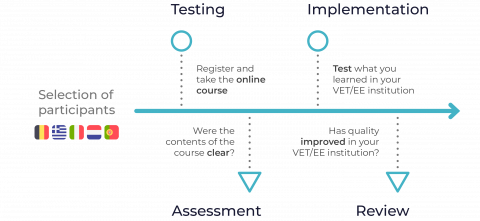Context
Over the last few decades, the idea of infusing entrepreneurship into education has spurred great enthusiasm among VET providers: developing the entrepreneurial skills of their students has proven to result in a myriad of positive effects ranging from economic growth and job creation all the way to individual growth, increased school engagement and improved equality.
EU policies have shown equal interest in entrepreneurship and recently produced a competence framework (EntreComp) to build consensus around a common understanding of the topic.
In light of this and of the EQAVET framework, the project seeks to improve the quality assurance in entrepreneurship education and enhance the training offers for VET providers in this sector.
Aims & Benefits
- Steering the offer of entrepreneurship education towards higher quality standards inspired by the EQAVET Framework
- Encouraging VET providers in entrepreneurship education to adopt clearer transparency mechanisms Improving the quality assurance skills of educators and mentors by creating a culture of quality
- Improving the quality assurance skills of educators and mentors by creating a culture of quality
Innovation
The project seeks to develop the following results:
- A baseline report for each partner country, which will highlight difficulties and successes in implementing quality assurance in entrepreneurship education in the national context and collect relevant data and best practices.
- A common reference framework developed to help future Quality Managers in entrepreneurship education to understand, plan and implement a quality assurance strategy in their organisations; among other resources, the reference framework will include a glossary, practices for an effective engagement of providers and staff as a whole as well as a strategy to reach out to the right stakeholders.
- Guidelines aiming to provide the right adaptation of the EQAVET standards and tools to entrepreneurship education.
- A description of the Quality Manager’s main competences and required skills, as well as training contents.
- Recommendations for the implementation of the whole system.




